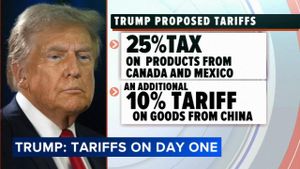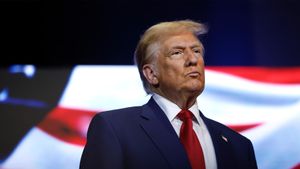With the inauguration of Donald Trump set for January 20, 2025, concerns are mounting over the potential economic risks to Germany, particularly stemming from Trump's renewed "America First" policies. Carsten Maschmeyer, the prominent entrepreneur and investor, warns these changes could cost Germany hundreds of billions of euros and suggests the country's economy may soon face significant challenges.
According to Maschmeyer, Trump’s strategies, including proposed tariffs of 10 to 20 percent on EU imports and up to 60 percent on goods from China, present serious threats to German exports. He stated boldly, "Donald Trump is back, and this time even more radical." This shift to protectionism is expected to create unprecedented pressures on the German automobile industry, which is fundamental to its economy.
Germany's Institute of Economic Research estimates the aggressive competition from the new Trump administration could result in losses as great as 180 billion euros—a staggering figure accounting for nearly 4 percent of the national economic output. Maschmeyer emphasizes the urgency of adopting countermeasures to safeguard German economic interests on the global stage.
Adding another layer to the economic tableau, Maschmeyer highlights the precarious alliance between Trump and Tesla's Elon Musk. He notes, "Trump needs Musk—and Musk needs Trump." Their relationship, particularly concerning potential regulations on platforms like TikTok, may leverage Musk's influence against foreign companies but remains fraught with risk. Maschmeyer elaborates, stating, "The alliance could crumble faster than expected due to their powerful egos and divergent interests, especially considering Musk’s heavy reliance on Chinese markets for Tesla's operations. If conflict arises, it could reverberate through the entire global economy, not just the U.S. market." This partnership's instability adds another layer of anxiety for tracking future economic relations.
Across the ocean, Russia is wrestling with its own economic challenges exacerbated by its strategies linked to the continuing Ukraine conflict. A recent analysis from Morgan Stanley banker Craig Kennedy reveals troubling indicators about Russian banks. While early assessments declared Russia's economy resistant to sanctions and war atrocities, Kennedy warns of the dangers lurking beneath this veneer.
He explains how Russian banks have engaged in risky practices to fund the war effort, masking the strain on both their economies and their balance sheets. This dual approach of state budgeting alongside questionable bank credit policies has created what Kennedy describes as "toxic debt," which poses significant danger moving forward.
Russia's Central Bank finds itself trapped, facing intense inflation pressures. The bank, which recently raised interest rates to unprecedented levels—currently sitting at 21 percent—faces backlash over its tightening of monetary policies. Kennedy observed the ramifications of these tactics, predicting inflation to soar as high as 10.5 percent within months. Liam Peach from Capital Economics expressed concern over this monetary tightening, stating, "The inflation is out of control, and we believe the tendency for tighter monetary policy will remain as inflation continues to rise and inflation expectations remain high."
Such steep interest rates have triggered payment defaults among businesses, with statistics showing 19 percent of medium and large businesses now facing delayed payments. The rush to prioritize aggressive inflation controls—while necessary—has left many worried about the long-term impact, particularly on businesses framed as the backbone of the economy.
Alongside these concerns, Maschmeyer urges Germany to sharpen its economic strategy. With Trump's return marking the dawn of cross-cutting economic headwinds for Germany, he posits the need for the nation to invest heavily in innovation and technology to remain competitive. It's becoming increasingly imperative for Germany to diversify its trade relationships, minimizing its dependency on both the United States and China as global economic conditions fluctuate.
Overall, the interplay between U.S. politics and global economic conditions, particularly manifesting through shifts toward protectionism and risky financial practices abroad, requires close attention. Both Germany and Russia are at crossroads where economic strategies must adapt to preserve market positions and withstand new forms of financial stressors. The horizon looks increasingly uncertain, and proactive measures may decide the fates of these coupled economies.



